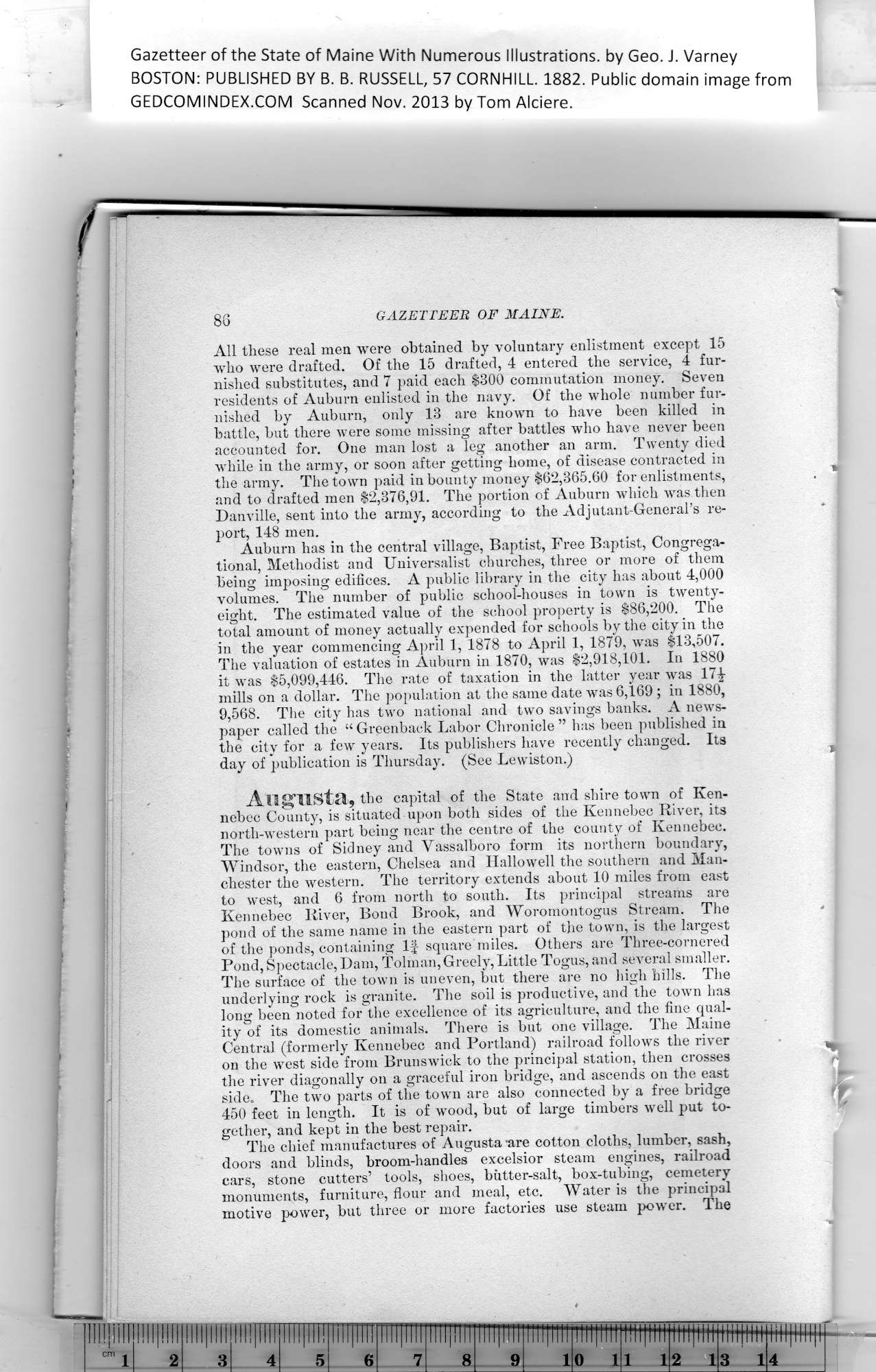|
Gazetteer of the State of Maine With Numerous Illustrations, by Geo. J. Varney
BOSTON: PUBLISHED BY B. B. RUSSELL, 57 CORNHILL. 1882. Public domain image from
80 GAZETTEER OF MAINE.
All these real men were obtained by voluntary enlistment except 15
who were drafted. Of the 15 drafted, 4 entered the service, 4 fur-
nished substitutes, and 7 paid each $300 commutation money. Seven
residents of Auburn enlisted in the navy. Of the whole number fur-
nished by Auburn, only 13 are known to have been killed in
battle, but there were some missing after battles who have never been
accounted for. One man lost a leg another an arm. Twenty died
while in the army, or soon after getting home, of disease contracted in
the army. The town paid in bounty money $62,365.60 for enlistments,
and to drafted men $2,376,91. The portion of Auburn which was then
Danville, sent into the army, according to the Adjutant-General’s re-
port, 148 men.
Auburn has in the central village, Baptist, Free Baptist, Congrega-
tional, Methodist and Universalist churches, three or more of them
being imposing edifices. A public library in the city has about 4,000
volumes. The number of public school-houses in town is twenty-
eight. The estimated value of the school property is $86,200. The
total amount of money actually expended for schools by the city in the
in the year commencing April 1, 1878 to April 1, 1879, was $13,507.
The valuation of estates in Auburn in 1870, was $2,918,101. In 1880
it was $5,099,446. The rate of taxation in the latter year was 17£
mills on a dollar. The population at the same date was 6,169 ; in 1880,
9,568. The city has two national and two savings banks. A news-
paper called the “ Greenback Labor Chronicle ” has been published in
the city for a few years. Its publishers have recently changed. Its
day of publication is Thursday. (See Lewiston.)
Augusta, the capital of the State and shire town of Ken-
nebec County, is situated upon both sides of the Kennebec River, its
north-western part being near the centre of the county of Kennebec.
The towns of Sidney and Vassalboro form its northern boundary,
Windsor, the eastern, Chelsea and Hallowell the southern and Man-
chester the western. The territory extends about 10 miles from east
to west, and 6 from north to south. Its principal streams are
Kennebec River, Bond Brook, and Woromontogus Stream. The
pond of the same name in the eastern part of the town, is the largest
of the ponds, containing If square miles. Others are Three-cornered
Pond, Spectacle, Dam, Tolman,Greely, Little Togus, and several smaller.
The surface of the town is uneven, but there are no high hills. The
underlying rock is granite. The soil is productive, and the town has
long been noted for the excellence of its agriculture, and the fine qual-
ity of its domestic animals. There is but one village. The Maine
Central (formerly Kennebec and Portland) railroad follows the river
on the west side from Brunswick to the principal station, then crosses
the river diagonally on a graceful iron bridge, and ascends on the east
side. The two parts of the town are also connected by a free bridge
450 feet in length. It is of wood, but of large timbers well put to-
gether, and kept in the best repair.
The chief manufactures of Augusta -are cotton cloths, lumber, sash,
doors and blinds, broom-handles excelsior steam engines, railroad
cars, stone cutters’ tools, shoes, butter-salt, box-tubing, cemetery
monuments, furniture, flour and meal, etc. Water is the principal
motive power, but three or more factories use steam power. The
PREVIOUS PAGE ... NEXT PAGE
This page was written in HTML using a program written in Python 3.2
|
